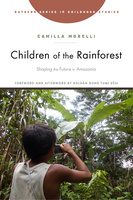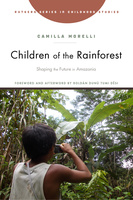Producing Children
Critical Studies in Childhood Creativity
Children’s culture is not only culture for children; it’s culture by children — yet scholars of children’s culture overwhelmingly center work by adults for children. Producing Children acknowledges and theorizes children as cultural producers, underscoring how such creativity empowers children as active participants in their own culture, and helps us to reconceive our understandings of children themselves.
Producing Children
Critical Studies in Childhood Creativity
Children’s culture is not only culture for children; it’s culture by children — yet scholars of children’s culture overwhelmingly center work by adults for children. Producing Children acknowledges and theorizes children as cultural producers, underscoring how such creativity empowers children as active participants in their own culture, and helps us to reconceive our understandings of children themselves.
Children as Social Butterflies
Navigating Belonging in a Diverse Swiss Kindergarten
Children as Social Butterflies offers an analysis of how children negotiate social belonging. Ursina Jaeger followed the children of a kindergarten class in a stigmatized and diverse neighborhood for several years, both inside and outside of school. Along with giving vivid insights into the children's everyday lives, she examines how social differentiation is learned in diverse societies.
Care and Agency
The Andean Community through the Eyes of Children
This book describes the lives of children in rural communities of the Andes Mountains of Peru. It foregrounds the children’s own perceptions and feelings, so far as they can be known by researchers using ethnographic methods. It shows the great variety of Andean childhoods – some happy, others harsh and demanding – and suggests the options children face: follow the many to migrate to the city or risk their hopes on a better future in the rural setting.
China's Left-Behind Children
Caretaking, Parenting, and Struggles
The Farm & Wilderness Summer Camps
Progressive Ideals in the Twentieth Century
Between Self and Community
Children’s Personhood in a Globalized South Korea
Children of the Rainforest
Shaping the Future in Amazonia
Children of the Rainforest
Shaping the Future in Amazonia
When Are You Coming Home?
How Young Children Cope When Parents Go to Jail
Global Child
Children and Families Affected by War, Displacement, and Migration
A World of Many
Ontology and Child Development among the Maya of Southern Mexico
Playing with History
American Identities and Children’s Consumer Culture
Life in a Cambodian Orphanage
A Childhood Journey for New Opportunities
Disputing Discipline
Child Protection, Punishment, and Piety in Zanzibar Schools
Belonging and Becoming in a Multicultural World
Refugee Youth and the Pursuit of Identity
The Queer Aesthetics of Childhood
Asymmetries of Innocence and the Cultural Politics of Child Development
All Together Now
American Holiday Symbolism Among Children and Adults
Weighty Problems
Embodied Inequality at a Children’s Weight Loss Camp
Weighty Problems
Embodied Inequality at a Children's Weight Loss Camp
Visual Encounters in the Study of Rural Childhoods
Complicated Lives
Girls, Parents, Drugs, and Juvenile Justice
Race among Friends
Exploring Race at a Suburban School
Producing Excellence
The Making of Virtuosos
The War of My Generation
Youth Culture and the War on Terror
Childhood in a Sri Lankan Village
Shaping Hierarchy and Desire
Kids in the Middle
How Children of Immigrants Negotiate Community Interactions for Their Families
Defining Student Success
The Role of School and Culture
Defining Student Success
The Role of School and Culture
Life on the Malecón
Children and Youth on the Streets of Santo Domingo
Life on the Malecón is a narrative ethnography of the lives of street children and youth living in Santo Domingo, Dominican Republic, and the non-governmental organizations that provide social services for them. Writing from the perspective of an anthropologist working as a street educator with a child welfare organization, Jon M. Wolseth follows the intersecting lives of children, the institutions they come into contact with, and the relationships they have with each other, their families, and organization workers.




























